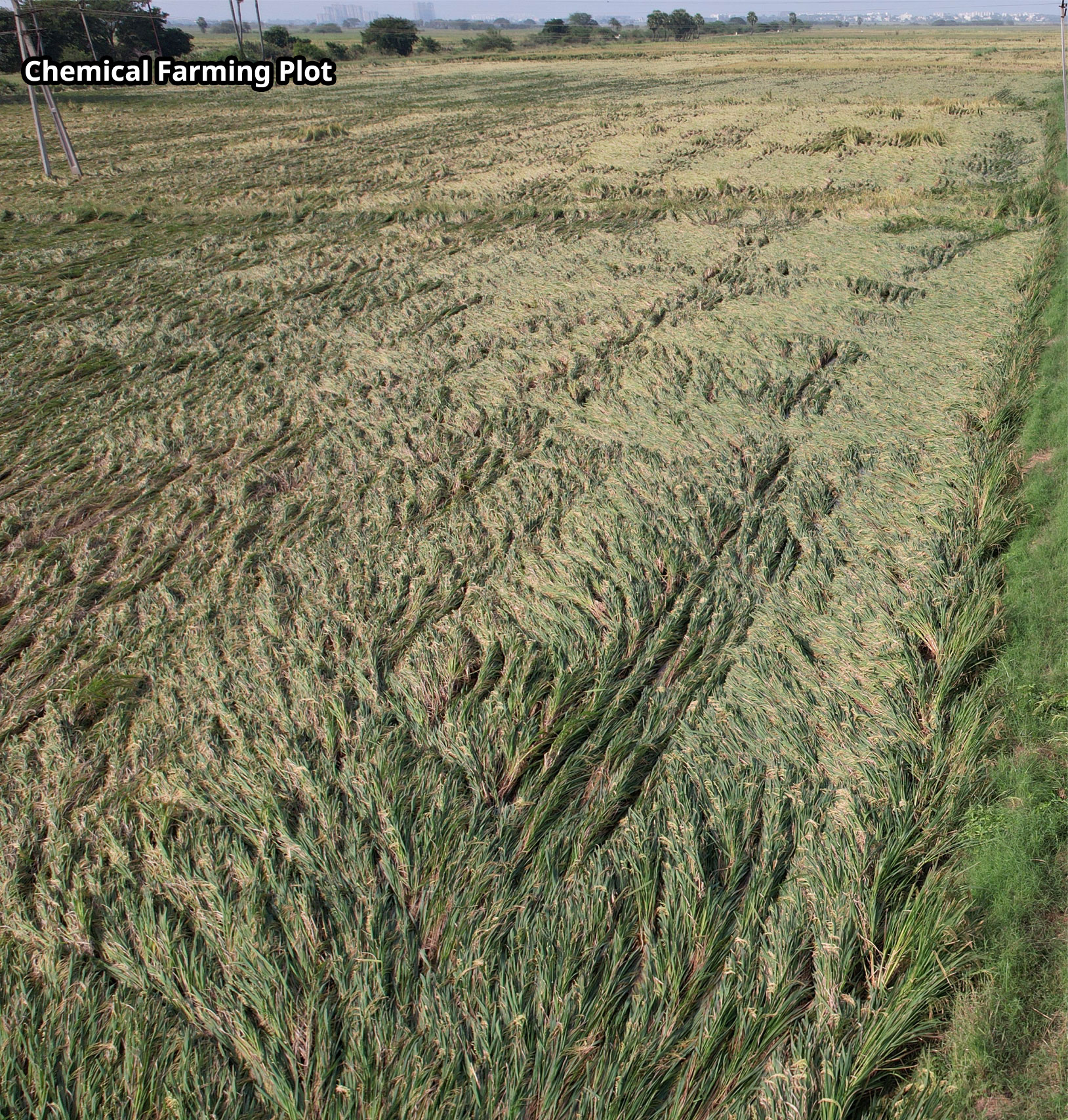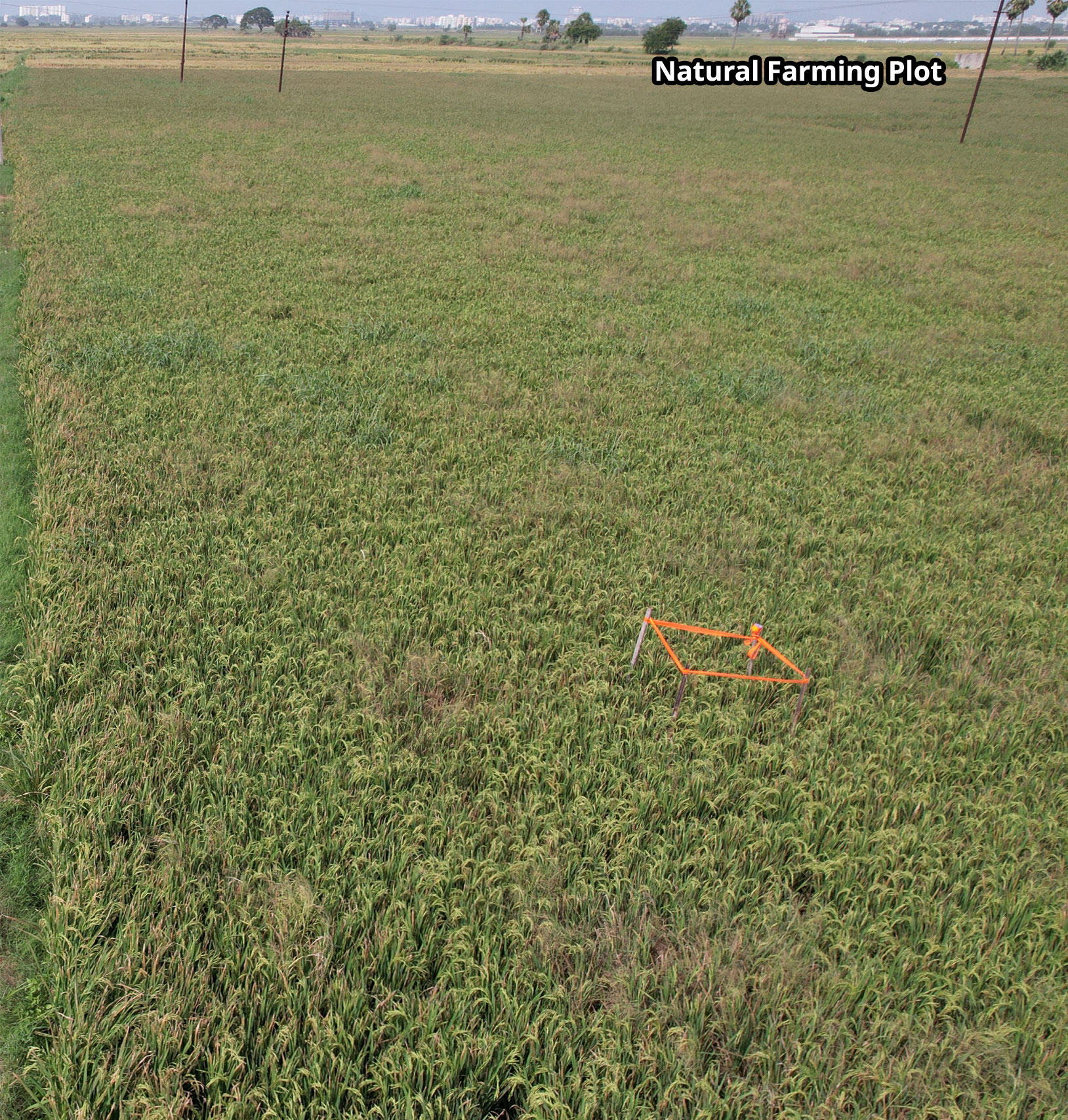APCNF – Towards farmer prosperity, better citizen health, climate resilience and cooling of the planet
In 2016, Government of Andhra Pradesh (India) launched the Andhra Pradesh Community Managed Natural Farming (APCNF) program under the aegis of Rythu Sadhikara Samstha (RySS) (translating to Farmers Empowerment Corporation), a not-for-profit company. The primary objective of the program was to find a long-term, sustainable solution to farmer distress in AP, caused by the economic crises in agriculture and rising climate change events.
APCNF partnered with an established network of Women Self Help Groups (SHGs) across Andhra Pradesh (which covered 95% of small farmer households), which helped kickstart the transition of farmers across the state into ‘natural farming’.
Natural Farming is essentially ‘farming that mimics nature’ including practices such as year-round green cover with diversified crops, use of biological stimulants, minimal soil tillage and non-use of synthetic fertilizers. The technology used is progressive and cutting-edge, based on modern science breakthroughs as well as farmer innovations, and offers increased yields, zero economic losses, and improved health benefits for farmers within the first season of transition. The key USP of the APCNF model is that it is a scalable, DIY, low-cost climate emergency solution, and can be easily replicated by smallholder farmers across different geographies and contexts.
Acknowledged as the world’s largest agroecology program, growing 25X from 40,000 farmers in 2016 to over a million smallholder farmers in 2024, APCNF has enabled natural farming being practised across 500,000 hectares in the state. The model owes its rapid scale-up in 9 years to its heavy reliance on farmer-to-farmer learning wherein Champion Natural Farmers are responsible for inspiring and capacity-building of more farmers to transition to NF, leading to a chain reaction of rapid adoption.
APCNF model is based on 6 Key levers
Power of women-led community movement
Power of extraordinary communication of ordinary farmers
Evolving technology
Government ownership
Collaboration with global agencies
Engagement of Community-Based Organizations
World’s Largest Agroecology Program
APCNF Vision :
Reach 8 million farmer households and landless farm worker households in Andhra Pradesh in the next 10 years
Serve as an inspiration for 120 million farmers across India
Initiate a global farmer-led natural farming movement of climate resilient food systems
Environmental and Social Impact
The model has immense environmental and social benefits, including increased biodiversity, climate resilience, reduced heat stress for the environment, as well as economic stability, improved nutrition, and empowerment of women, for farmers.
- Farmer income increased – 2020-2022: 56.5 – 80% per year
- Cost savings: 2020-2022: 15.5 – 18% per year
- GHG Climate Emission Reduction: 29.7 – 91.1%, depending on crop
- Water savings: Up to 50%
- Biodiversity improvement: 7 times the earthworm increase, 55% avian count increase and 60% increase in beneficial insects.
- Government’s return on Investment: 1$ invested benefits gov’t finances up to 6-8$
Scaling supported by: > 10,000 farmer-coaches - Climate Resilience: APCNF crops withstood the disastrous Michaung Cyclone in Andhra Pradesh in December 2023.
*Source – APCNF internal studies and independent verification agencies. Reports upon request
The Science of Natural Farming
The cornerstone of the APCNF model is all enrolled farmers adhere to the nine universal principles of natural farming.
Bridging science and community IGGAARL -2023
Indo-German Global Academy for Agroecology Research and Learning (IGGAARL) has been launched in collaboration with the Government of Germany in 2023. The Institute provides training to the farmers through Farmer Scientist course. It is a 4-year Bachelor’s degree in Natural Farming – A flagship program, launched on July 22nd 2023. Field Practice and Practical Work to be 75% of the credits. Conceptual inputs via Classroom and Digital Learning 520 Farmer Scientists Students and 184 Mentors – for 2023-24 Academic year; Champion NF farmers are the teachers
Our Footprint
In India – RySS is incubating the NF model in 12 states across India
1.Madhya Pradesh
2.Meghalaya
3.Rajasthan
4.Chhattisgarh
5.Himachal Pradesh
6.Karnataka
7.Maharashtra
8.Odisha
9.Telangana
10.Uttarakhand
11.Jharkhand
12.Tamil Nadu
Over 45 countries have visited APCNF to study the Natural Farming Model
Resources on APCNF
Our farmer’s voices
Growing Crops 365 Days – Radhamma Natural Farming Journey
Rooted in APCNF universal principles of Natural Farming, farmer Radhamma cultivates rain-fed groundnut on 1.5 acres and as many as 12 vegetables on another piece of land which has scanty water resource. Radhamma’s groundnut crop withstood India’s longest dry spell in the rainy season of July & August, 2023. Her farm produces abundant nutrient-rich and residue-free food 365 days, bringing her average monthly income of Rs.35, 000-45,000 ($ 420 – $520)
Fortunes of Natural Farming
Crops like pomegranate whose yields are not guaranteed in spite of heavy dosage spraying chemicals, Ravi Pratap Reddy 6-acre Natural Farming orchard has yielded 40 tonnes pomegranate, fetching him whopping Rs.400,0000 ($48,076) with minimal expenses of Rs.100,000 ($1200) in the third year after transplantation in 2023. His success stands as a testimony for commercial viability of Natural Farming even for the big farmers.
Fruits of Natural Farming
Natural Farming not only transformed financial condition of farmer couple Venkataramudu and Venkatalakshmi. But also overall psychological well-being of their whole family. As a result of learning and implementing APCNF crop diversity model in banana crop, they earned Rs.13, 60,000 ($ 16,350) from 2-acre banana crop with vegetable intercrops.
Recognition for APCNF
Latest News
Podcasts
Academic Publications
- Patel, R., & Thallam, V. K. (2024, June 17). Subsidy transition bonds as a funding mechanism for agroecological transformation. Nature News.
- Duddigan, S., Collins, C. D., Hussain, Z., Osbahr, H., Shaw, L. J., Sinclair, F., Sizmur, T., Thallam, V., & Ann Winowiecki, L. (2022a, February 1). Impact of zero budget natural farming on crop yields in Andhra Pradesh, Se India. MDPI.
- Khandelwal, A., Agarwal, N., Jain, B., Gupta, D., & Jhon, A. (2023, November 30). Investigating pathways for agricultural innovation at scale. CEEW.
- Natural farming through a wide angle lens: True Cost Accounting Study of community-managed natural farming in Andhra Pradesh, India. Global Alliance for the Future of Food. (2023, November 7).
- Hussain, Z., Boppana, B., Anisetti, H., Soma, R., & Gangisetty, S. (2022). Do birds return to agricultural landscapes through adoption of natural farming practices? A comparison of natural farming vs. chemical farming in Andhra Pradesh. Agricultural Sciences, 13(03), 358–377.
- Apcnf. (2024, March 27). Agroecology and sustainable smallholder agriculture – experience of natural farming in Andhra Pradesh. Andhra Pradesh Community Managed Natural Farming.
- Ch, L. D., Bharath, Y., Bliznashka, L., Kumar T, V., Jonnala, V., Chekka, V., Yebushi, S., Roy, A., Venkatesh Murthy, N. S., Prabhakaran, P., & Jaacks, L. M. (2024, May 13). Evidence of potential impacts of a nutrition-sensitive agroecology program in Andhra Pradesh, India, on dietary diversity, nutritional status, and child development. PloS one.
Beans, C. (n.d.). Can Countries Expand Agriculture without Losing Biodiversity? Weighing the options for feeding a growing world. Academic.oup.com.
Partners Testimonials
Our Partners









































